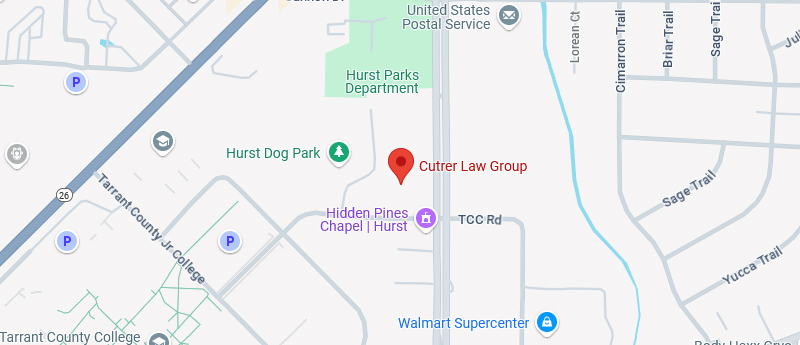Spousal Support Lawyer Tarrant County
After a divorce, sometimes one spouse needs financial support to get back on their feet. There are many different possible arrangements when it comes to spousal support, and this can be a contentious issue in a divorce situation. It is important to note that spousal support and spousal maintenance are not the same things.
Spousal support is generally voluntary, while spousal maintenance is court-ordered and enforceable. The state of Texas does not use or recognize the term “alimony,” though this is a common term for spousal support or maintenance.
Whenever the parties in a divorce can come to agreements without having to go to court, that is preferable. Our spousal support attorney is very adept at assisting divorcing couples in coming to mutually agreeable terms, whether about spousal support or other contentious issues. If reaching an agreement is impossible, however, Ms. Cutrer has the skill and experience as a trial lawyer to represent her clients successfully in court.
If you and your soon-to-be-ex-spouse are having difficulty coming to an agreement about spousal support in Texas or if you have questions, contact our spousal support attorney today at 817-854-1651 to discuss your options.
What’s the Difference Between Spousal Support and Spousal Maintenance in Texas?
Spousal support, which is typically known as interim spousal support or temporary spousal support, is awarded during divorce proceedings and usually is paid in the form of cash support or direct payments for ongoing bills of the parties while the divorce is pending. Spousal Maintenance is a longer-term form of financial support that typically extends long past the finalization of the divorce.
Texas was one of the first states to pass a specific spousal maintenance statute. The statute is fairly strict, and the spouse seeking support must prove eligibility based on certain criteria, discussed below.
Spousal maintenance in Texas is limited to a maximum of $5,000 or 20 percent of the average monthly gross income of the spouse paying support–whichever is less. Spousal maintenance continues for up to five years for a marriage of 10 years or more, seven years for a marriage of 10 to 20 years, or up to 10 years for a marriage of 30 years or more, but for the “shortest reasonable period that allows the spouse seeking maintenance to meet the spouse’s minimum reasonable needs by obtaining appropriate employment or developing an appropriate skill.”
In other words, spousal maintenance in Texas is meant to last only long enough for the receiving spouse to gain job skills that will allow them to earn enough money to provide for themselves.
Exceptions to the time limits are made for receiving spouses who are disabled or who are the primary caregivers of disabled children.
Are There Requirements for Spousal Maintenance Awards?
In Texas, there are basically four circumstances in which a spouse is likely to be awarded spousal maintenance.
The easiest method is for both parties to agree to specified spousal support payments over a specified time period. If no such agreement can be reached, the courts may award spousal maintenance.
Spousal maintenance may be awarded if the spouse seeking maintenance or their child was the victim of family violence for which the other party was convicted or received deferred adjudication. The offense had to have occurred within two years of the divorce filing or while the divorce is pending. There is no requirement for the length of the marriage in this instance.
Another situation that may result in a spousal maintenance order is a marriage that lasted for 10 years or more, and the spouse seeking support lacks sufficient property or income to provide for their reasonable needs while at the same time serving as the caretaker of a disabled child, is disabled themselves, or lacks the ability to earn enough to meet their minimum reasonable needs in the future.
Sponsored immigrant spouses could gain spousal maintenance by enforcing the Affidavit of Support executed by the other spouse and requesting that the judge order the sponsor to provide support until the immigrant spouse becomes a U.S. citizen or until they have earned 40 credits of work history. This support is paid at 125% of the Federal Poverty Guidelines if awarded.
Is Spousal Maintenance Available for Common Law Marriages?
If a couple has agreed to be married, lives together as husband and wife, and has represented themselves as a married couple to others, they are considered married by common law in Texas. Spousal maintenance is available for common law marriages in Texas, under the same guidelines as legal marriages.
Spousal support payments may also be available to a spouse who entered a marriage in good faith but later found that the marriage was invalid due to reasons that the spouse was not aware of, such as a previous marriage that was not legally dissolved.
Tarrant County Spousal Support Lawyers
Many lawyers spread themselves thin over multiple practice areas, learning a little about each, but not a lot about any. Attorney Anita Cutrer is Board Certified in Family Law by the Texas Board of Legal Specialization and has practiced family law for more than 20 years as a specialty.
Ms, Cutrer accepts family law cases from Tarrant and surrounding counties only, giving her comprehensive knowledge not only of family law but also of the county courts and judges. This gives her clients the edge and leads to the most favorable outcomes possible.
Contact the office of Anita K. Cutrer, Attorney at Law, at 817-854-1651 for a consultation.


 1845 Precinct Line Road
1845 Precinct Line Road info@akcfamilylaw.com
info@akcfamilylaw.com 817-854-1651
817-854-1651



